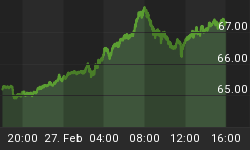In regards to Average 30-Year Mortgage Rate Hits 4.47% (Not Counting Fees); Affordability Check Michael Becker at WCS Funding Group just pinged me with his thoughts on why mortgage rates will go up in 2014 even if treasury rates stay flat.
Michael writes ...
Hey Mish,
I was just reading your post on rising mortgage rates and I can confirm that mortgage rates are approaching the highs reached earlier this year in early September.
Additionally, they are set to go higher in 2014 regardless of whether or not the yield on the 10 year Treasury continues to rise. The agency that oversees Fannie and Freddie, the FHFA, has announced another increase in their guarantee fees or g-fees and increases in their loan-level price adjustments or LLPA.
The former are charges to lenders for guaranteeing mortgage backed securities and the latter are risk based adjustments to pricing on mortgages. The new increases in both will be charged to borrowers and will increase mortgage rates as much as .375% for many borrowers.
The FHFA has stated the reason for these increases is to encourage private money, non-Fannie or Freddie, to return to the mortgage market. While that is a good idea and many in the industry would like to see that happen, it's hard to see that happening with the new Qualified Mortgage (QM) rules issued by the Consumer Finance Protection Bureau CFPB starting on January 10, 2014.
Without going into much detail these new rules will restrict lending in the future and I believe discourage private money from entering the mortgage market.
So with rising rates, increased fees making rates even higher than they would be otherwise, and mortgage credit being further restricted it's hard to see how real estate will continue to recover in 2014 as affordability decreases.
Regards,
Michael Becker
WCS Funding Grp.
New "Qualified Mortgage" Rules May Mean Less Lending
The Chicago Tribune reports It'll take time to see effect of new mortgage rules
New regulations governing home loans take effect Jan. 10, but it's likely to take a few months to see how much they really alter a prospective borrower's ability to get a mortgage.
Combined with other tweaks made in the past few months, the changes will mean new terminology and revamped paperwork for lenders to understand and then explain to borrowers in 2014. They also could lead to less lending, experts say.
The goal of the new mortgage rules from the Consumer Financial Protection Bureau is to better protect borrowers from the lax underwriting that wreaked havoc on people and the housing market. The regulations are designed to ensure a borrower's "ability to repay" a mortgage while also offering lenders protection from borrower lawsuits so long as they make safer so-called qualified mortgages.
"I think the mainstream borrower is going to be OK," said Bob Walters, chief economist at Quicken Loans. "Lenders will go through a period of adjustment. There will be some upset in the first half of the year as people digest the rules."
The borrowers most likely to be affected are those on the lower and higher ends of the lending spectrum.
The rules bar some loan products that all but disappeared during the housing crisis -- interest-only loans, balloon-payment loans and mortgages with terms that extend past 30 years -- from being considered qualified mortgages.
Under another part of the rule, a borrower's overall debt can make up no more than 43 percent of gross income. The effect of that provision will be muted, however, because, at least temporarily, it does not apply to loans that will be purchased by Fannie Mae or Freddie Mac or backed by the Federal Housing Administration. Those agencies continue to account for the overwhelming majority of new mortgage loans.
However, Fannie Mae, Freddie Mac and the FHA all are looking to limit their exposure, and thereby the taxpayer's exposure, in the housing market.
The FHA last month decreased its maximum loan limits for 2014. The Federal Housing Finance Agency, which regulates Fannie Mae and Freddie Mac, this month said it was considering reducing the maximum loan size it may buy.
Housing experts say one effect of that rule could be that consumers looking for loans in the $100,000 to $150,000 range may find fewer lenders from which to choose. That's because a loan has to go through the same amount of paperwork and underwriting, regardless of whether it's for $100,000 or $400,000.
"Lenders may not do those loans," said Ken Perlmutter, president of Perl Mortgage. "It's just as much work, and you can't change the fees."
That 3 percent cap also could affect a borrower's ability to buy down their interest rate by paying points upfront, as well as restrict the ability of people with lower incomes and risky credit, who typically have paid higher fees, to receive a mortgage.
Jumbo mortgages also could become harder to receive because they too must meet the 43 percent debt-to-income ratio to be considered a qualified mortgage. However, Perlmutter said he already is seeing investors step in who are interested in purchasing mortgages that fall outside the government's regulations.
2014 Summary
- More Consumer Protections
- Loans Harder to Get
- More Fees
- All things equal, 0.375 Percentage Point Hike in Mortgage Rates
Actual amount of increase or decrease of mortgage loan rates in 2014 will depend on treasury rates, but the base assumption (if treasury yields remain unchanged) is a hike in mortgage rates of 0.375 percentage points, with some loans harder to get irrespective of rates.















